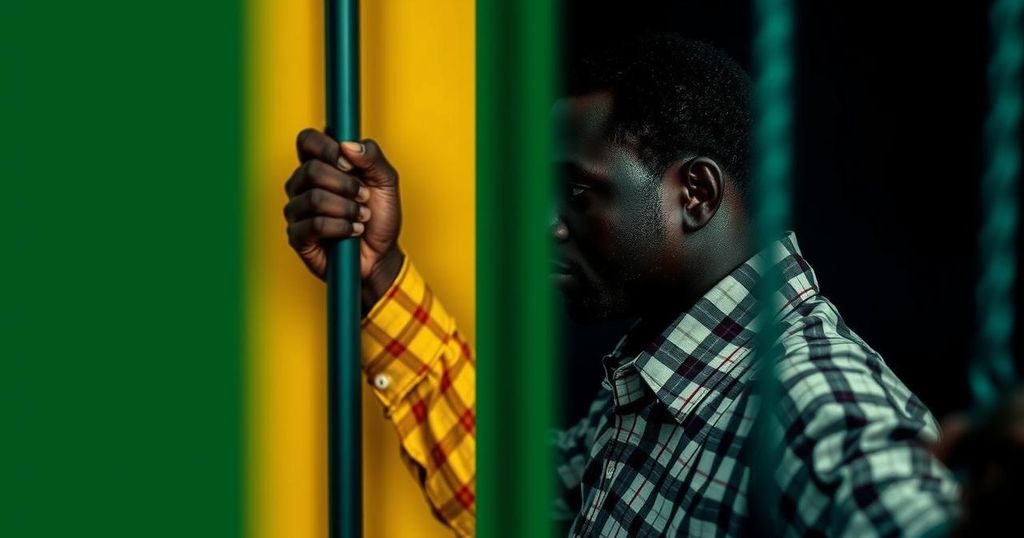Ugandan lawyer Kalali Steven has filed a lawsuit against the DRC at the East African Court of Justice, alleging severe human rights violations in Makala Central Prison, including extreme overcrowding, physical abuse, and sexual violence against female inmates. The lawsuit calls for accountability under the EAC Treaty and highlights the dire conditions that have led to numerous fatalities, restricted legal access, and the illegal detention of minors. Kalali seeks court declarations of violation, compensation for inmates, and endorsement of better prison conditions, emphasizing the need for human rights protection in the EAC.
Ugandan attorney Kalali Steven has initiated legal proceedings against the Democratic Republic of Congo (DRC) at the East African Court of Justice, claiming significant violations of human rights within the Makala Central Prison. Kalali’s lawsuit alleges that the DRC government is responsible for extreme prison overcrowding, physical abuse, and instances of sexual violence directed at female detainees in the Kinshasa-based institution. Kalali contends that these deplorable conditions infringe upon the East African Community (EAC) Treaty as well as various international human rights statutes. The legal complaint has been filed with the First Instance Division located in Arusha, Tanzania, with the objective of holding the DRC accountable as a Partner State of the EAC. This action follows a tragic attempt at a jailbreak that occurred from September 1 to 2, 2024, during which numerous lives were reportedly lost owing to violent security measures. According to Kalali, “DRC forces used live ammunition on unarmed inmates,” citing over 129 deaths, which constitutes a violation of the fundamental right to life as stipulated in the EAC Treaty. The prison, originally designed to accommodate 1,500 inmates, was reported to be holding approximately 14,000 individuals at the time of the incident, as per findings from a United Nations report. Kalali asserts that such an alarming level of overcrowding represents a blatant disregard for human dignity and contravenes Article 7(2) of the EAC Treaty, which mandates compliance with international standards. Moreover, the suit draws attention to harrowing allegations of sexual violence, indicating that “269 out of 348 female prisoners reportedly experienced sexual abuse,” based on research by the United Nations Population Fund (UNFPA). Kalali argues that the DRC’s failure to safeguard female inmates represents a breach of international norms pertaining to women’s rights. Additionally, the lawsuit highlights the restricted access to legal representation and civil support following the aforementioned escape attempt. Kalali claims that, since the incident, legal advocates and civil organizations have been denied access to detainees, violating Article 8(1)(c) of the EAC Treaty. “Inmates lack legal representation and necessary services, violating the Treaty’s principles on justice,” he emphasized. Furthermore, Kalali alleges that minors are being unlawfully detained alongside adult inmates in Makala Prison, a practice he insists jeopardizes the welfare of young detainees and violates both international regulations and the United Nations Convention on the Rights of the Child. In his lawsuit, he seeks declarations from the court that the DRC has violated the EAC Treaty, demands compensation for the affected prisoners, and requests improvements to prison conditions, in addition to an injunction to prevent future abuses. The ramifications of Kalali’s lawsuit are significant within the East African context, as it raises critical issues regarding accountability among Partner States in the adherence to human rights within the EAC framework. “The EAC must ensure the protection of its citizens’ rights,” he urged, calling upon the court to enforce regional standards and hold the DRC accountable for its human rights obligations. As this case progresses, advocates for human rights across East Africa are keenly observing its potential effects on prisoner rights and state accountability throughout the EAC region, with the possibility of establishing a vital precedent influencing prison management and human rights practices across the area.
The situation concerning Makala Central Prison in the Democratic Republic of Congo is indicative of broader issues within the prison systems of East Africa, particularly regarding human rights standards and the treatment of inmates. Reports of overcrowding, abuse, and inadequate legal support reflect systemic challenges that many prisons face in the region. The East African Community (EAC) Treaty espouses commitments to human rights, but failures in enforcement and accountability persist. Kalali’s lawsuit underscores the necessity for regional mechanisms to address these violations and protect the rights of individuals in detention. The DRC’s recent history of political turmoil and instability only compounds these issues.
In conclusion, Kalali Steven’s lawsuit against the DRC at the East African Court of Justice highlights critical human rights issues within Makala Central Prison, including severe overcrowding, abuse, and inadequate protections for vulnerable populations such as women and minors. By challenging the DRC’s compliance with regional and international legal standards, Kalali not only seeks justice for the affected inmates but also aims to prompt a broader dialogue on accountability and reform within the prison systems of East Africa. The outcome of this case may establish a significant precedent for human rights enforcement within the EAC, potentially leading to improved conditions for inmates and heightened responsibilities for Partner States in safeguarding human rights.
Original Source: allafrica.com






